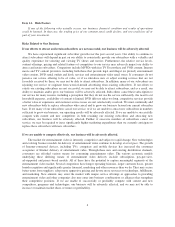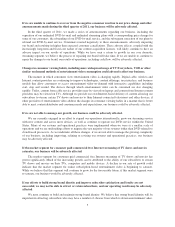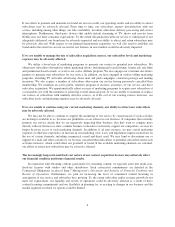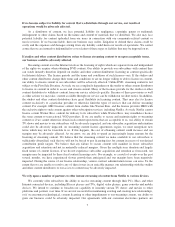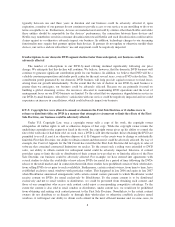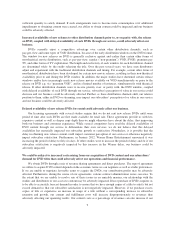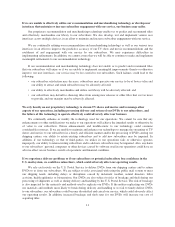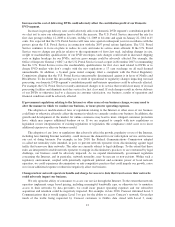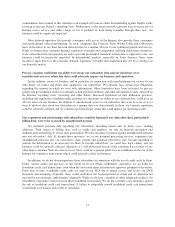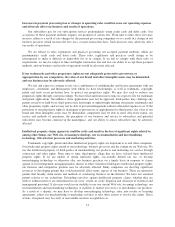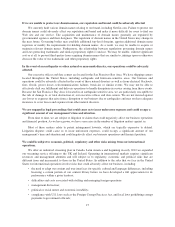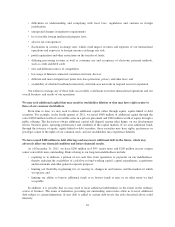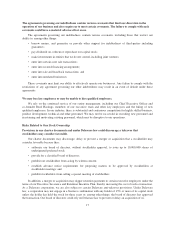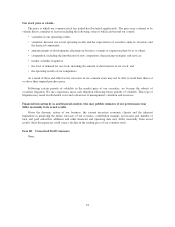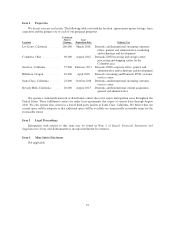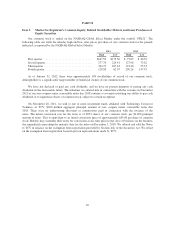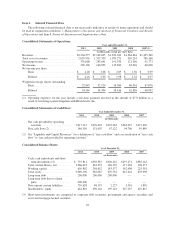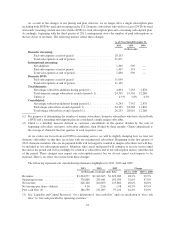NetFlix 2011 Annual Report Download - page 16
Download and view the complete annual report
Please find page 16 of the 2011 NetFlix annual report below. You can navigate through the pages in the report by either clicking on the pages listed below, or by using the keyword search tool below to find specific information within the annual report.Increases in payment processing fees or changes to operating rules would increase our operating expenses
and adversely affect our business and results of operations.
Our subscribers pay for our subscription services predominately using credit cards and debit cards. Our
acceptance of these payment methods requires our payment of certain fees. From time to time, these fees may
increase, either as a result of rate changes by the payment processing companies or as a result in a change in our
business practices which increase the fees on a cost-per-transaction basis. Such increases may adversely affect
our results of operations.
We are subject to rules, regulations and practices governing our accepted payment methods, which are
predominately credit cards and debit cards. These rules, regulations and practices could change or be
reinterpreted to make it difficult or impossible for us to comply. If we fail to comply with these rules or
requirements, we may be subject to fines and higher transaction fees and lose our ability to accept these payment
methods, and our business and results of operations would be adversely affected.
If our trademarks and other proprietary rights are not adequately protected to prevent use or
appropriation by our competitors, the value of our brand and other intangible assets may be diminished,
and our business may be adversely affected.
We rely and expect to continue to rely on a combination of confidentiality and license agreements with our
employees, consultants and third-parties with whom we have relationships, as well as trademark, copyright,
patent and trade secret protection laws, to protect our proprietary rights. We may also seek to enforce our
proprietary rights through court proceedings. We have filed and from time to time we expect to file for trademark
and patent applications. Nevertheless, these applications may not be approved, third-parties may challenge any
patents issued to or held by us, third-parties may knowingly or unknowingly infringe our patents, trademarks and
other proprietary rights, and we may not be able to prevent infringement without substantial expense to us. If the
protection of our proprietary rights is inadequate to prevent use or appropriation by third parties, the value of our
brand and other intangible assets may be diminished, competitors may be able to more effectively mimic our
service and methods of operations, the perception of our business and service to subscribers and potential
subscribers may become confused in the marketplace, and our ability to attract subscribers may be adversely
affected.
Intellectual property claims against us could be costly and result in the loss of significant rights related to,
among other things, our Web site, streaming technology, our recommendation and merchandising
technology, title selection processes and marketing activities.
Trademark, copyright, patent and other intellectual property rights are important to us and other companies.
Our intellectual property rights extend to our technology, business processes and the content on our Web site. We
use the intellectual property of third-parties in merchandising our products and marketing our service through
contractual and other rights. From time to time, third-parties allege that we have violated their intellectual
property rights. If we are unable to obtain sufficient rights, successfully defend our use, or develop
non-infringing technology or otherwise alter our business practices on a timely basis in response to claims
against us for infringement, misappropriation, misuse or other violation of third-party intellectual property rights,
our business and competitive position may be adversely affected. Many companies are devoting significant
resources to developing patents that could potentially affect many aspects of our business. There are numerous
patents that broadly claim means and methods of conducting business on the Internet. We have not searched
patents relative to our technology. Defending ourselves against intellectual property claims, whether they are
with or without merit or are determined in our favor, results in costly litigation and diversion of technical and
management personnel. It also may result in our inability to use our current Web site, streaming technology, our
recommendation and merchandising technology or inability to market our service or merchandise our products.
As a result of a dispute, we may have to develop non-infringing technology, enter into royalty or licensing
agreements, adjust our merchandising or marketing activities or take other actions to resolve the claims. These
actions, if required, may be costly or unavailable on terms acceptable to us.
14


